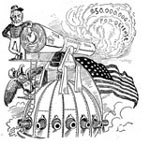
The Spirit of Democracy & the Threat of Elitism
A PARADOX THAT CANNOT BE OVERCOME
Wallace Mendelson, a late great friend and mentor, was fond of saying that “no man is fit to govern another.” In that simple and true statement is contained the whole spirit of democracy. Not any particular form of democracy, but any political expression of the idea that men ought to be allowed some meaningful say in the decisions that determine how they are to live their lives. The “ought” in this statement suggests that democracy is, in some sense, a moral requirement, not merely a political form.
Why is it a moral requirement? It is not because democracies always make better policies than aristocracies, oligarchies, or monarchies, for they surely do not. Nor is it because everyone’s ability to govern is equal, for surely, as in all other things, some are more competent at this than others. It is only because no man is really fit to govern another, period. It is well to remember this teaching, for some say that democracy is under attack as never before, though I think, for reasons that will become apparent, it is under attack as always before.
Americans bask in ignorance of the true history of democracy. We stand on the shoulders of the giants of our founding and live in the shadows of the institutions they created. Those institutions are an experiment and, like all experiments, are fraught with danger. And the greatest of all dangers for a risk-taker is to forget that there is a risk. We act as if democracy is the norm of history, and deviations from its ideal exceptional. It is quite the other way around. Take all the area of the earth, multiply it by all the time in which men have walked it. That is the denominator. The numerator is the amount of time multiplied by the area in which anything resembling democracy has existed. What is the fraction? It is minuscule. Why is it minuscule? It is because democracy, in any form, has always been at risk, and democrats have always and everywhere forgotten this, sooner or later.
It has usually been sooner. Cleisthenes, some say, founded Greek democracy, and thus perhaps democracy itself. Themistocles defended that democracy against the Persian challenge, but once the Persians were gone, the Athenians began to feel secure, became complacent, and Themistocles was ostracized. Pericles rose, but succumbed to plague, Athens succumbed to Sparta, and the wars that followed ushered in Alexander the Great’s empire. The Roman republicans tried constitutional government in a different way, but ended up ushering in another empire. And so the story goes, on and on. As John Adams said two centuries ago, “Democracy never lasts long. It soon wastes, exhausts, and murders itself. There never was a democracy yet that did not commit suicide” (Letter to John Taylor, Apr. 15, 1814).
You May Also Enjoy
Review of Confessions of a Parish Priest by Andrew Greeley, A Path From Rome by Anthony Kenny, and Catholic America by John Cogley
A popular children’s book remains on the 'Teachers’ Top 100 Books' list although its ostensible aim appears to be to denigrate Polish Americans.
American Catholics must be careful not to be more American than Catholic, especially since American politics is essentially Protestant.

